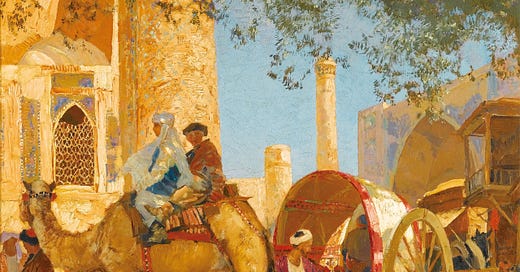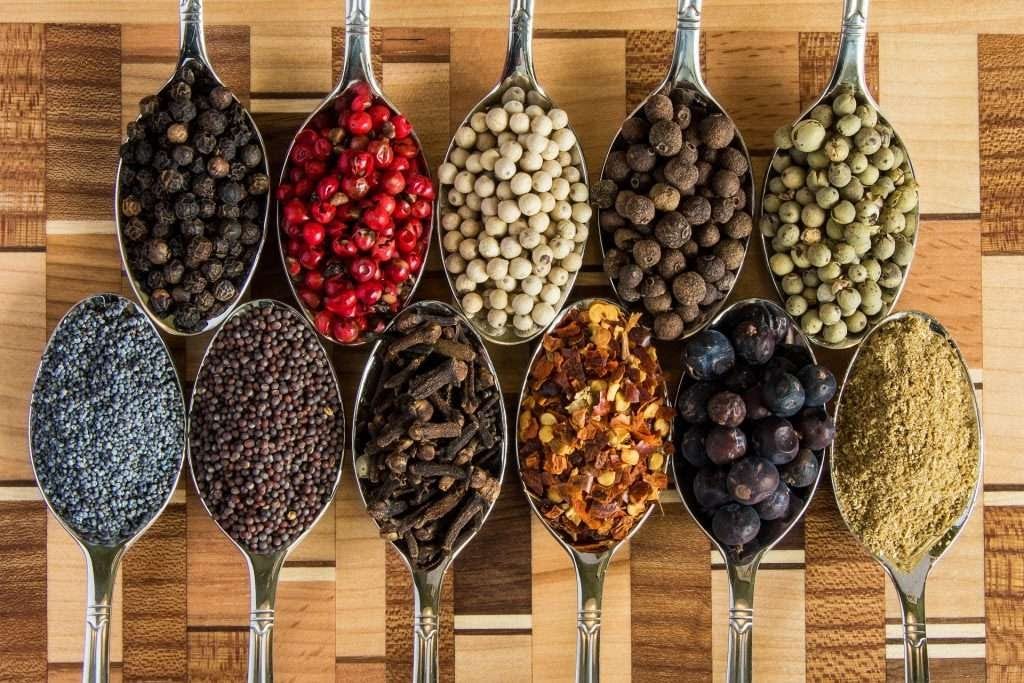Hey all, here is your standard reminder to subscribe to the newsletter! Press the button below to get started! You can even pay a small amount for it if you want. That’d be cool. Who doesn’t love to support their local writer?
If you’ve taken any sort of “Western Civ” or “World History” class you’ve probably heard about the spice trade. Maybe even the Silk Road, the massive trade route(s) that helped people living in Europe, Africa, and Asia exchange goods with each other across continents. You also probably learned that Europeans at the time (think like 500 CE-1500 CE) absolutely loved spices. That they would do anything to get their grubby little hands on some seasonings from Asia. Pepper, cinnamon, cloves, ginger, etc. That is all true as far as it goes.
That sound you’re hearing is one thousand Medievalists ripping their hair out in anger that I missed some subtlety or another. Ignore them.
What you may also have heard – I know I’m assuming a lot about my reader’s ability to remember or care about what they learned in middle school history class but bear with me –that they wanted these spices because they used them to cover up the smell and taste of the rotten meat that they ate. I learned that little factoid somewhere between middle school and high school. I’ve continued to hear it since then as well, sometimes reading it in peer-reviewed academic works, and occasionally in a class.
While it’s a pretty funny story, Europeans did not buy spices so that they could eat rotten meat. The myth that medieval – most historians hate calling it “Medieval” by the way, but I’m going to keep doing it – Europeans ate rotten meat is a pernicious one. Food historians have disproven it over and over again at least since the 1980s, but despite their best efforts, people still repeat it, even in academia. It’s kind of funny because as a myth, it doesn’t really even make sense. Rotten, or even rancid, meat tastes disgusting and makes you sick. Why would medieval Europeans pay a ton of money to cover up the taste of something that made them sick? That would just be stupid.
Also, there’s just no way pepper and cinnamon, no matter how much of it you use, could cover up the taste or smell of rotten or rancid meat. If you’ve ever smelled a piece of chicken gone bad, you know that in your soul. Europeans also generally had access to other meat preservation techniques, including salting, air curing, smoking, and pickling, all of them far less expensive than buying a bunch of spices. In the winter, most Europeans could just freeze their meat by storing it outside. There’s also the price thing. In the 1400s at least, a whole pig cost as much as a pound of pepper. Pepper was the most common and therefore cheapest spice. Why would someone pay for a pound of pepper to put on a rotten pig, when you could just have a fresh pig? It doesn’t make sense.
The fact remains that Europeans did go pretty crazy for spices, even if peasants could rarely afford the cost of them. In part, spices were a class thing, a way for the rich to distinguish themselves from the hoi polloi. There was also a fascination with “the East” during this time, and many people collected as much stuff from Asia as they could. Finally, pepper and cinnamon just taste good. Who wouldn’t want a little pepper in their barely mash? There are a few other reasons/subtleties here, but we don’t have time to get into them. Check out Tastes of Paradise by Wolfgang Schivelbusch, Paul Freedman’s Out of the East: Spices and the Medieval Imagination, and Terence Scully’s The Art of Cookery in the Middle Ages if you’re interested in more about why Europeans loved spices. There’s also some interesting literature on why Europeans later stopped using Asian spices so much. Hint, it’s racism.
So why then does this myth persist? It’s not like it holds up to even the weakest examination. Three reasons jump out at me immediately. One, the myth that Medieval times represented a “Dark Ages” continues to persist. The idea goes that with the Fall of Rome, knowledge was lost, and people lived in a state of ignorance until the Enlightenment. That’s not true either. This period certainly differed from the height of the Roman Empire, but people didn’t magically get dumber. In fact, it’s hard to pinpoint what really was “lost” during this time. People continued to use techniques and technology developed during the Roman Empire, long after its demise. In some places sure, people lost information/skills/tech, but in other places, they retained them and continued their use.
Secondly, this rotten meat story has lasted so long in part because a lot of people cling to the myth of the Whigs, or a positive teleology. The idea that things will only progress until we reach an end goal of history having perfected everything around us. A predetermined place where all of this is heading. If things were worse in the past (like having to eat rotten meat) then that means that not having to eat rotten meat is just part of us moving forward into a better world. That the final stage of history moves ever forward. This is bullshit and something that most historians have worked to dissuade people of over the last few decades at least. There is no end state that this is all leading to. Sorry!
Finally, we like to think that we are wildly different from our ancestors. Sure, those dumb peasants living in mud huts or whatever may have been your great-great-great-great-great+-grandparents, but at least we’re different from them. Nowadays we don’t do stuff like eating rotten meat. That’s a nice thought to have, but it’s not really the truth. To be sure European peasant life was far different from our lives today. Cosmologies and ways of thinking about the world were different. They didn’t have TV. there are still lots of commonalities between medieval peasants and modern-day people. They still tended to live by water and food sources. Concerns about the environment were massive. Finding ways to heat abodes during the winter remained a massive concern. The Catholic Church was still rich. In short, people were different, but different in ways that make sense. Regularly eating rotten/rancid meat does not make sense.
Crazy things do happen in history. Humanity is full of wonderful, odd, interesting people. Individually, and as a whole, people have done crazy things. Just look up The Great Cat Massacre, the Sphinx, The Cheese and the Worms, or WWI if you don’t believe me. It’s easy to believe every nuts story that you hear. The trick is to make sure you confirm it. Think about it. Do some research. Humanity may be wild, but it’s usually not stupid.
Liked what you read? Please share! Sharing is caring!




